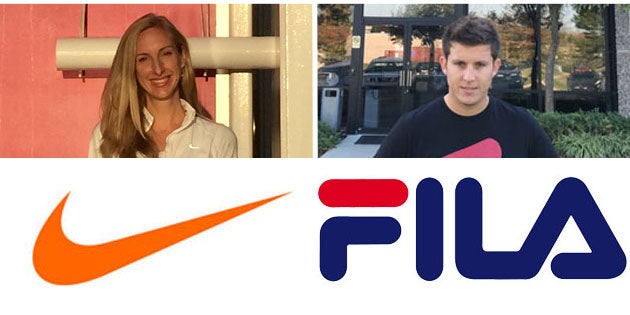Those must-have athletic shoes in your favorite local shop didn’t run, jump or pole-vault themselves onto the sales floor. They got there through a complex, finely tuned process that connects manufacturers, distribution centers and consumers all over the world.
And in today’s global economy, these crucial supply chains are not only the lifeblood of business, they are also hotbeds of opportunity for professionals who want to tackle high-stakes logistical challenges for major international companies.
That’s what drew College of Charleston alumni Alexis Heifner Carrico ’03 and Julio González Piera ’10 to their supply chain careers at Nike and Fila. Both of the former student-athletes and international business majors say their academic experiences at the College helped prepare them for challenging and rewarding careers.
As program director for Nike’s Emerging Markets Supply Chain group, Carrico is responsible for aligning and standardizing processes across Nike’s smaller emerging market territories. When she’s not traveling to countries such as Mexico (where she’s currently working on a project) or to Nike headquarters in Oregon, she works remotely from her home base in Charleston, where she lives with husband Tim Carrico ’03 and their young daughter.
For Carrico, an Ohio native who competed on the College’s equestrian team and also majored in Spanish, a study abroad trip to Chile was the “hook” that led to her first job out of college. “The company I worked for was Chilean, and the fact that I understood the Chilean culture and could speak Spanish (and understand ‘Chilean’ Spanish which has a lot of slang) helped me not only land the job but also to get promoted quickly,” she says.
After earning an MBA from Georgetown, Carrico began working in finance at Nike before moving to the supply chain group. Since then, traveling and experiencing different cultures all over the world have been mainstays of her job.
“While working at Nike I’ve traveled all over South America and Asia, to Europe (including Russia), and even to Australia – so I’ve loved not only working in those countries, but also learning about the history of the places I’ve visited, the people, the food and the architecture.”
Piera, who was born and raised in Marbella, Spain, is a supply chain analyst at Fila USA. From his base in Baltimore, Piera works directly under the company’s senior vice president of supply chain operations to streamline processes from manufacturing and importation to distribution and retail sales.
“On any given day I can be working on our inbound or outbound transportation, our internal process flows in the distribution center (DC), inventory and demand analysis, space utilization and capacity in the DC, or even vendor relationships for all our supplies in the warehouse,” he says.
An internship in the College’s international business program exposed Piera to his future career path when he completed an internship at IDEA, LLC, a logistics company in North Charleston. That was a stepping-stone to a full-time job as an import specialist at Mediterranean Shipping Company in Charleston and eventually to his current career with Fila.
Piera, who played tennis at the College, says his courses in the School of Business gave him a leg up on presenting ideas and data to groups.
“No matter how good your idea or initiative is, if it is not presented correctly, efficiently and backed up with reasoning or data, it will be almost impossible to convince and, furthermore, implement that change in an organization,” he says. “On a regular basis, I do the monthly executive reporting for the corporate suite performance meetings, including dashboards.”
As for traits and characteristics that make someone a good fit for a career in supply chain, Carrico and Piera say it’s important to work well with a diversity of people at all levels of an organization – from the manufacturing floor to the C-suite. Other key qualities and skills include adaptability to change, data analysis and root cause identification, and being humble and willing to pay your dues as a junior employee.
Learn more about the College’s major in supply chain and information management.
Working in the sportswear industry has its perks, too.
Nike’s Portland campus is a playground for sports fans and health-conscious people, says Carrico. “Nike has an amazing campus with multiple buildings named after professional athletes (I worked in the John McEnroe and then Alberto Salazar buildings), two gyms, two sports fields, a track, a lake, small waterfall, – all surrounded by a cross-country course. I regularly saw athletes on campus and you could wear a Nike sportswear T-shirt, jeans and some sneakers to work every day and could work out over lunch.”
Piera agrees, and says he’s often decked out in Fila gear. “You get great markdowns or giveaways, get to go to sporting events, discounts with different vendors, and if you are lucky enough and are involved in the right projects you may get to meet famous athletes.”
So the next time you go shopping for new sneakers or fitness clothing, remember the ever-important role of the supply chain and the many processes and professionals involved in its orchestration. There’s a lot going on behind the scenes, including a couple of talented and hard-working Cougars.








